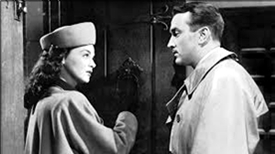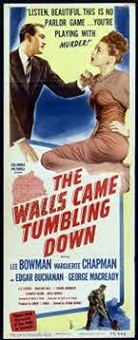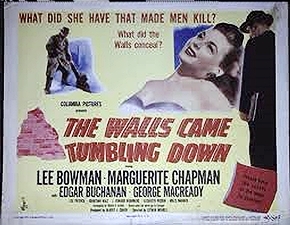Mon 17 Jun 2024
A Movie Review by David Vineyard: THE WALLS CAME TUMBLING DOWN (1946).
Posted by Steve under Crime Films , Reviews[7] Comments

THE WALLS CAME TUMBLING DOWN. Columbia Pictures, 1946. Lee Bowman, Marguerite Chapman, Edgar Buchanan, George Macready, Lee Patrick, Jonathan Hale, J. Edward Bromberg, Miles Mander, Elizabeth Risdon. Screenplay by Wilfred H. Pettitt, based on the novel by Jo Eisinger. Directed by Lothar Mendes.
The title of the film, and the McGuffin (Leonardo’s The Fall of Jericho), are the only original touches in this out and out rip off of The Maltese Falcon, right down to Lee Patrick as the hero Gilbert “Archer’s” (Lee Bowman) secretary.
A priest has been murdered to make it look like suicide and gossip columnist Gilbert Archer is out to find his killer which seems to have something to do with a lost Leonardo masterpiece, the priest was hiding to protect it.

Patricia Foster aka Laura Browning (Marguerite Chapman) is the mystery woman in the case supposedly seeking the painting with her excitable father Ernst Helms (J. Edward Bromberg, think Joel Cairo), while the Reverend Matthew Stoker (Macready) is none too subtle about what he would do to find it with his patroness Catherine Walsh (Elizabeth Risdon) and their lawyer George Bradford (Edgar Buchanan). There’s even a hood name Rausch (Noel Cravat) in the role of an over aged Wilbur.
Most of the subtlety is gone, as well as any erotic tension between Bowman and Chapman (or the Gutman, Cairo, and Wilbur stand-ins who are all straight), but it is virtually a scene for scene steal from Falcon beyond that down to the bit where Archer (Spade) tips a hotel detective off about Rausch (Wilbur).
It does vary a bit at the end, the McGuffin isn’t a lead bird, and Chapman and Bowman end in a clinch, but it so blatantly rips off Falcon it’s shocking Hammett or Huston didn’t sue for plagiarism.
I assume the Eisinger novel was very little like the film, or action surely would have been taken. It feels as if the book might have been rather more pious than this, and too dull to film if you go by the preamble before the Falcon plot kicks in, so it was dressed up with the plot of the Hammett film and novel.

Macready is sufficiently evil and threatening as a crooked evangelistic type, and Buchanan oily as a crooked lawyer, while Bromberg is about as subtle as a train wreck, but thankfully the plot is changed up enough he makes an early departure as the bodies stack up.
As far as production values go it looks good, none of the actors are bad, but none of them overly good either. Bowman fared better in a few comedies as a lead or second lead when he had good material. He isn’t awful, he just has nothing to work with other than look like a poor substitute for Bogart (honestly, in this he’s a poor substitute for Ricardo Cortez; the attempts to change his character from solemn avenger of his priest friend to bright fast talking Spade substitute are jarring enough to loosen fillings). His hero has all the charisma of his television Ellery Queen, which is none.
The whole business about his being out to avenge his friend the priest just doesn’t work with the Falcon plot that requires a fast talking Spade who may or may not be quite honest and didn’t even like his partner, and this being 1946 they don’t dare suggest anything untoward about the dead priest to enliven the plot a little. Hammett’s plot can’t bear any saintly characters other than Effie.
I suppose if you had never seen The Maltese Falcon and stumbled on this one late one night you might enjoy it. It’s not incompetent, badly acted, cheaply made, or poorly directed. In fact if they had just honestly remade Hammett I might have given it a C for effort, it’s not as bad as the Warren William film by any means.
But it is a jarring film, lurching from fairly solemn to wise cracking and back again as if Sam Spade had been rewritten as Father Brown, and the result is a film that doesn’t know what it is and as a result isn’t very good as anything.

June 18th, 2024 at 6:44 am
If a movie from Columbia Pictures in the late ’40s or early ’50s had a crafty, articulate villain, it was sure to be George Macready–everything from Westerns (THE NEVADAN) to swashbucklers (THE BLACK ARROW).
June 18th, 2024 at 11:59 am
A “crafty, articulate villain”. That sums up George Macready on the screen perfectly!
June 18th, 2024 at 9:24 am
I’ve read the novel. Disappointing, because I like much of Eisinger’s screen work. The book starts out as a send-up of THE MALTESE FALCON, with the main character a society columnist looking to find out who killed his old-time friend, a priest who was long ago given a pair of bibles that hold the key to a dead artist’s missing mural. The character’s name is D’Arcy in the book, which they changed to Archer (as in Sam Spade’s murdered partner) and the story starts out with a woman lying about her name and her interest in the missing bible; a cast of exotic adventurers competing with each other and D’Arcy for finding the bibles, a whole passel of bogus stories about the bibles’ history, etc. After a breezy beginning, it turns into a standard murder mystery, totally marred by an extended exposition (in letter form, no less) explaining everything that happened and taking the last five pages or so to do it. The mystery is decent enough, but the abrupt change in tone is rather jarring, as if Eisinger’s publisher issued the old theater warning, “Satire is what closes on Saturday night” [when Broadway shows opened on a Saturday] and Eisinger dropped the parody element.
June 18th, 2024 at 12:04 pm
Thanks, Bill. As far as I know, I’ve never read the book nor seen the movie, but your summary of the book has me convinced that I have and my memory bank is leaking like a sieve.
Or could it be that you’re reminding me of another book by another author? And I’m not thinking of FALCON. Maybe one of John Evans’ books about PI Paul Pine???
June 18th, 2024 at 2:00 pm
I found this film entertaining, especially with this supporting cast. I didn’t think about The Maltese Falcon at all. I guess I’m easily pleased by these old mystery programmers!
June 19th, 2024 at 5:41 pm
I can see now where the blatant rip off of the Falcon came from, but there is no satire here. I grant if you don’t see the Falcon aspect it might pass as a decent mystery with a good cast, but it still lurches rather than flows, and Bowman’s pious avenger and wisecracking PI tires pretty fast.
June 19th, 2024 at 10:34 pm
I haven’t mentioned this before, since no one would believe me anyway, but I’ve had the movie in my queue of films to be watched for some time now. David just happened to beat me to it. I might as well go ahead and watch it though, trying very hard to forget what David has said about the film. It will be hard, but then again, I’ve gotten used to having to do very difficult things.